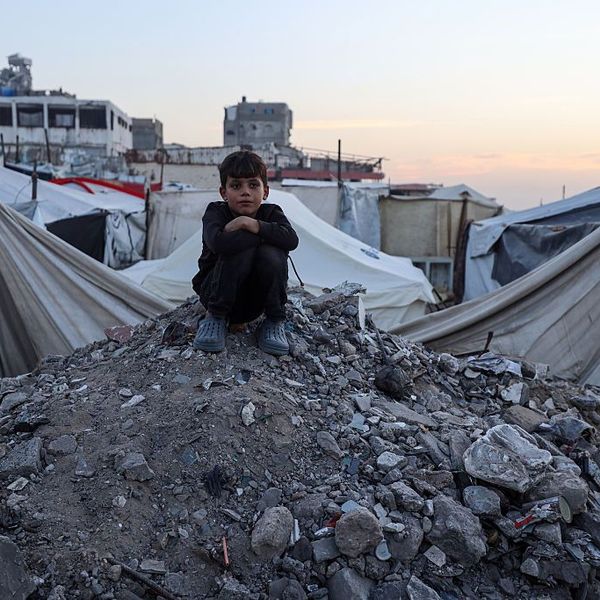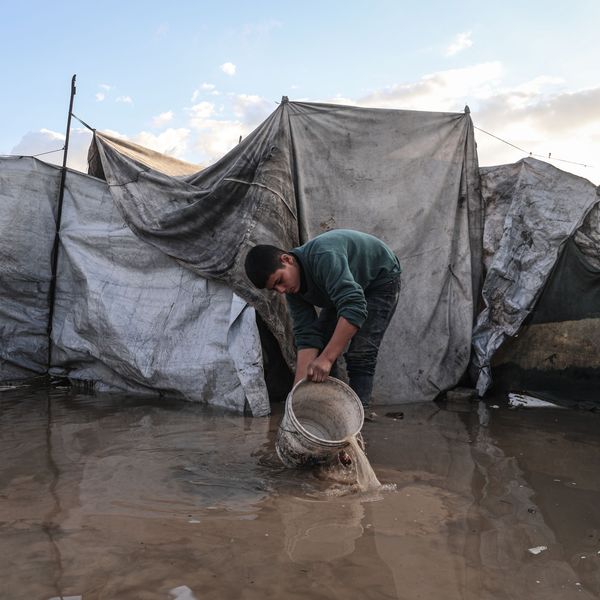Strangled By War and Siege, Gaza's Economy 'On Verge of Collapse': World Bank
Global body calls for 'lifting of the blockade on the movement of goods and people to allow Gaza’s tradable sectors to recover'
Nine months after Israel's 51-day military assault on Gaza, a damning new report released by the World Bank finds that the 1.8 million residents of this besieged strip of land face the highest unemployment rate in the world and an economy on the "verge of collapse."
Approximately 43 percent of the strip's population is unemployed, and for youth, joblessness was at a stunning 60 percent at the end of 2014, finds Friday's report, which will be presented next week in Brussels to the Ad Hoc Liaison Committee--the body that coordinates international donations to the Palestinian Authority.
The study draws a direct line between these economic conditions, wars, and the U.S.-backed siege--which has escalated dramatically since 2007.
"The ongoing blockade and the 2014 war have taken a toll on Gaza's economy and people's livelihoods," said Steen Lau Jorgensen, World Bank country director for West Bank and Gaza, in a report summary. "Gaza's exports virtually disappeared and the manufacturing sector has shrunk by as much as 60 percent. The economy cannot survive without being connected to the outside world."
"Even more shocking is the reality that most of Gaza's 1.8 million residents are confined to an area of 160 km2 and are not able to travel beyond this area without permits," Jorgensen added.
The dismal conclusions prompted even this international body--not known for a strong analysis of the occupation and dispossession of Palestinians--to call for the "lifting of the blockade on the movement of goods and people to allow Gaza's tradable sectors to recover."
The World Bank, of course, is not the first body demand a halt to the siege. Palestinian civil society has long called for an immediate end to the blockade, and a series of freedom flotillas have sought to break the siege, including one currently en route from Sweden.
This latest report comes on the heels of prior findings that reconstruction in Gaza, following last summer's war, has barely gotten off the ground. Nearly 50 aid agencies warned in April that the strip's civilian infrastructure remains decimated, with an estimated 100,000 people in Gaza homeless, and as of last month, not one of the 19,000 homes destroyed in the war had been rebuilt.
An Urgent Message From Our Co-Founder
Dear Common Dreams reader, The U.S. is on a fast track to authoritarianism like nothing I've ever seen. Meanwhile, corporate news outlets are utterly capitulating to Trump, twisting their coverage to avoid drawing his ire while lining up to stuff cash in his pockets. That's why I believe that Common Dreams is doing the best and most consequential reporting that we've ever done. Our small but mighty team is a progressive reporting powerhouse, covering the news every day that the corporate media never will. Our mission has always been simple: To inform. To inspire. And to ignite change for the common good. Now here's the key piece that I want all our readers to understand: None of this would be possible without your financial support. That's not just some fundraising cliche. It's the absolute and literal truth. We don't accept corporate advertising and never will. We don't have a paywall because we don't think people should be blocked from critical news based on their ability to pay. Everything we do is funded by the donations of readers like you. Will you donate now to help power the nonprofit, independent reporting of Common Dreams? Thank you for being a vital member of our community. Together, we can keep independent journalism alive when it’s needed most. - Craig Brown, Co-founder |
Nine months after Israel's 51-day military assault on Gaza, a damning new report released by the World Bank finds that the 1.8 million residents of this besieged strip of land face the highest unemployment rate in the world and an economy on the "verge of collapse."
Approximately 43 percent of the strip's population is unemployed, and for youth, joblessness was at a stunning 60 percent at the end of 2014, finds Friday's report, which will be presented next week in Brussels to the Ad Hoc Liaison Committee--the body that coordinates international donations to the Palestinian Authority.
The study draws a direct line between these economic conditions, wars, and the U.S.-backed siege--which has escalated dramatically since 2007.
"The ongoing blockade and the 2014 war have taken a toll on Gaza's economy and people's livelihoods," said Steen Lau Jorgensen, World Bank country director for West Bank and Gaza, in a report summary. "Gaza's exports virtually disappeared and the manufacturing sector has shrunk by as much as 60 percent. The economy cannot survive without being connected to the outside world."
"Even more shocking is the reality that most of Gaza's 1.8 million residents are confined to an area of 160 km2 and are not able to travel beyond this area without permits," Jorgensen added.
The dismal conclusions prompted even this international body--not known for a strong analysis of the occupation and dispossession of Palestinians--to call for the "lifting of the blockade on the movement of goods and people to allow Gaza's tradable sectors to recover."
The World Bank, of course, is not the first body demand a halt to the siege. Palestinian civil society has long called for an immediate end to the blockade, and a series of freedom flotillas have sought to break the siege, including one currently en route from Sweden.
This latest report comes on the heels of prior findings that reconstruction in Gaza, following last summer's war, has barely gotten off the ground. Nearly 50 aid agencies warned in April that the strip's civilian infrastructure remains decimated, with an estimated 100,000 people in Gaza homeless, and as of last month, not one of the 19,000 homes destroyed in the war had been rebuilt.
Nine months after Israel's 51-day military assault on Gaza, a damning new report released by the World Bank finds that the 1.8 million residents of this besieged strip of land face the highest unemployment rate in the world and an economy on the "verge of collapse."
Approximately 43 percent of the strip's population is unemployed, and for youth, joblessness was at a stunning 60 percent at the end of 2014, finds Friday's report, which will be presented next week in Brussels to the Ad Hoc Liaison Committee--the body that coordinates international donations to the Palestinian Authority.
The study draws a direct line between these economic conditions, wars, and the U.S.-backed siege--which has escalated dramatically since 2007.
"The ongoing blockade and the 2014 war have taken a toll on Gaza's economy and people's livelihoods," said Steen Lau Jorgensen, World Bank country director for West Bank and Gaza, in a report summary. "Gaza's exports virtually disappeared and the manufacturing sector has shrunk by as much as 60 percent. The economy cannot survive without being connected to the outside world."
"Even more shocking is the reality that most of Gaza's 1.8 million residents are confined to an area of 160 km2 and are not able to travel beyond this area without permits," Jorgensen added.
The dismal conclusions prompted even this international body--not known for a strong analysis of the occupation and dispossession of Palestinians--to call for the "lifting of the blockade on the movement of goods and people to allow Gaza's tradable sectors to recover."
The World Bank, of course, is not the first body demand a halt to the siege. Palestinian civil society has long called for an immediate end to the blockade, and a series of freedom flotillas have sought to break the siege, including one currently en route from Sweden.
This latest report comes on the heels of prior findings that reconstruction in Gaza, following last summer's war, has barely gotten off the ground. Nearly 50 aid agencies warned in April that the strip's civilian infrastructure remains decimated, with an estimated 100,000 people in Gaza homeless, and as of last month, not one of the 19,000 homes destroyed in the war had been rebuilt.

